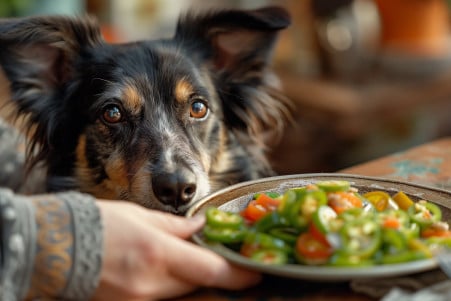Can Dogs Eat Wasabi? Understanding the Risks for Your Pet
5 March 2024 • Updated 4 March 2024

While wasabi is known for its heat in humans, how does it measure up as a treat for dogs? It is best to steer clear of giving dogs wasabi, as it can cause digestive issues. The heat can cause dogs to sneeze, vomit, or cough. If a dog has eaten wasabi and seems uncomfortable, it is best to talk to a vet to get the right treatment.
Our in-depth analysis will delve into the latest veterinary research and nutritional recommendations to help you better understand the impact of wasabi and other spicy foods on dogs. Our investigation will provide a deeper understanding of the way dogs digest food and taste flavors, which will help us determine what foods are safe for dogs.
Our hope is to give you the information you need to protect your pet and make sure that your dog’s diet is both healthy and delicious.
Can dogs eat wasabi?
What Happens When Dogs Eat Wasabi?
The first thing that happens when dogs eat wasabi is that they experience the same burning sensation that humans do. However, unlike the capsaicin in chili peppers, which causes a dull, burning pain, the chemicals in wasabi cause a sharp, intense pain that travels up the nasal passages. This can cause dogs to sneeze, vomit, or gag, and can even lead to temporary pain and discomfort.
This is because, as reported by DogTime, wasabi is so potent that it can cause a dog’s stomach to become inflamed. In fact, while wasabi isn’t toxic to dogs, according to WagWalking, it can cause gastrointestinal distress that may require medical attention. Therefore, if your dog eats wasabi and experiences vomiting or diarrhea, you should contact your vet right away to see if your pet needs to be seen.
This is especially important because you’ll want to make sure that your dog is treated as soon as possible if they do need medical attention. This will help ensure that they don’t experience any more pain or discomfort and that they don’t develop any other health problems.
You should also keep a close eye on your dog after they eat wasabi to make sure that they don’t experience any other symptoms that could indicate that they’re experiencing more than just a little bit of pain and discomfort. This could be a sign that they’re experiencing more severe gastrointestinal distress.
Canine Taste and Digestive System
Dogs have a taste system that is very different from humans. They have only about 1,700 taste buds, while humans have around 9,000, so they have a much less refined sense of taste. According to the American Kennel Club, dogs’ taste buds are most sensitive to water and meat, which makes sense given their history as carnivores, and are not sensitive to flavors like wasabi.
PetMD explains that dogs prefer sweet flavors to salty, spicy, sour, or bitter ones, which they may avoid because they are associated with things that are toxic.
A paper published on PubMed explains that the canine digestive system has several differences from the human digestive system. These include a faster small intestine transit time and a more variable intestinal pH, both of which can impact how dogs digest spicy flavors like wasabi.
These differences in the way the digestive systems of humans and dogs work mean that dogs’ bodies can’t handle spicy foods like wasabi. This means that while humans might enjoy wasabi, it’s not just not good for dogs, it can also cause them pain and discomfort.
How Spicy Foods Affect Dogs
Eating spicy foods can have a number of effects on a dog’s health. While a small taste of something spicy, like wasabi, every once in a while may not have any lasting effects, dogs should not eat spicy foods on a regular basis.
Ingredients like capsaicin, which is found in chili peppers and other spicy foods, can cause dogs immediate pain and discomfort, and the effects may become more serious over time. According to A-Z Animals, dogs can even develop pancreatitis and stomach ulcers from eating spicy foods, both of which are painful and potentially fatal.
In addition to the above, MasterClass says that spicy foods can lead to long-term health issues. The Spruce Pets warns that feeding dogs spicy foods can lead to food aversion, weight loss, and digestive upset.
Because dogs are smaller and have different metabolisms than humans, even a small amount of spicy food can lead to health issues and complications. By feeding dogs a diet that’s free of spicy foods, pet parents can help ensure that their pets don’t face these risks and can maintain a healthy digestive system.
How to Make Sure Your Dog Gets a Balanced Diet
A dog’s diet must meet their specific nutritional needs, which include proteins, fats, carbohydrates, vitamins, and minerals. VCA Animal Hospitals explains that, while dogs are omnivores, the most important thing is the quality and digestibility of these nutrients. Proteins are needed for tissue repair, fats are needed for energy, and carbohydrates are needed for dietary fiber.
PetMD explains that life-stage nutrition is important because puppies, adults, and senior dogs all have different nutritional needs. It’s also important to avoid feeding dogs things like wasabi that can cause digestive upset. Instead, dogs should be fed a diet that includes whole-food ingredients and is formulated for their specific life stage. Not only will this help avoid digestive problems, but it will also help promote good health.
The Canine Welfare Science Center at Purdue explains that a good diet can help prevent diseases and set the stage for a dog’s overall health and well-being. By choosing the right commercial food that’s formulated for your dog’s life stage and lifestyle, you can help support things like skin and coat health and cognitive health.
By choosing a high-quality food that’s tailored to your dog’s specific needs, you can ensure that your dog has a safe and effective diet that will help them live a long, healthy life.
So, Can Dogs Eat Wasabi?
In conclusion, the spicy kick of wasabi that humans love is definitely not something that dogs should eat. From the immediate reactions of sneezing and coughing to the potential for more serious stomach issues, the dangers of giving dogs wasabi are real.
Our look into what dogs can eat has shown that the differences between human and dog taste buds and digestive systems are vast, and that’s why some human foods, especially spicy ones, are not good for dogs.
It’s important for pet parents to follow the rules of what dogs can and can’t eat to ensure that their dogs are healthy and happy. A well-rounded, species-appropriate diet is important, and that includes avoiding foods like wasabi that can throw off a dog’s digestive system.
To make sure that you’re keeping your dog healthy, learn about the dietary guidelines that have been approved by veterinarians and choose foods that are safe and healthy for dogs. After all, your dog is depending on you to make sure that they’re eating what’s best for them, and that means that you need to make sure that you’re doing your research and making the best decisions for them.
This exploration of learning what’s best for your pet’s diet will help you make sure that you’re keeping them healthy, joyful, and with you for a long duration.


